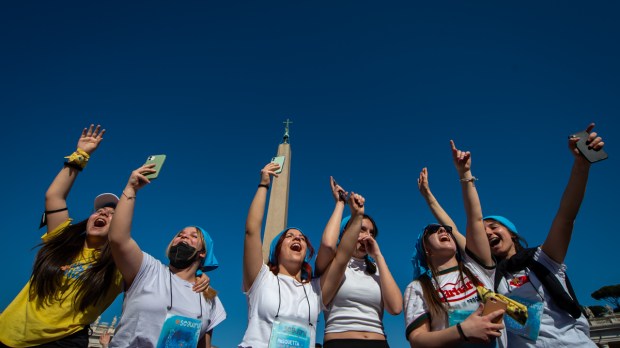Lenten Campaign 2025
This content is free of charge, as are all our articles.
Support us with a donation that is tax-deductible and enable us to continue to reach millions of readers.
I have been busy writing at Aleteia about signs of hope, and now I can unveil what it was all headed toward: The true narrative of Christianity in our time.
We are used to the narrative that we have heard in school, and in the media: That Christianity had its heyday in the past, but that now it is on the wane. People have turned their back on the faith. New truths have invalidated the claims of the faith. Christianity has entered its twilight years.
It’s not true. That’s not the story of Christianity in our time. This is:
Jesus has more followers worldwide than ever before, and despite weakening in the West, Christianity is still going strong even here.
My article “Statistics show hope for a Catholic future,” runs through the numbers and answers some common misconceptions.
Worldwide, religion isn’t dying. Secularism is. The four major religions are growing, with Christianity experiencing huge growth in African nations and Asian nations.
In America, Christianity isn’t collapsing; nominal Christianity is, and good riddance. Evangelical Christianity continues its steady growth. Yes, there is bad news for Catholicism in America — but good news, too, as we shall see.
Jesus has increasing numbers of young followers, too.
“Research shows the faith is young; check out these numbers,” said the next article.
Whether it’s young people flooding the March for Life in Washington, D.C., or the 17,000 young people at SEEK 23, the yearly conference of Focus, there are teens and young adults excited about the faith.
At World Youth Days we see the largest gatherings of young people in the west, and young people are being reached at every stage through apostolates and a growth in Catholic school attendants.
Catholic colleges that follow St. John Paul II’s Apostolic Constitution for Higher Education, Ex Corde Ecclesiae are bursting at the seams and Newman Centers focused on delivering authentic faith are doing very well at state schools. All of this means that young people who are showing themselves more likely to discern vocations too.
This energetic growth is being served by a rediscovery of the sacraments.
And young vocations aren’t the only reason “Inviting someone to Mass isn’t strange,” as the next article put it.
The Church has been renewing the Mass throughout the 21st century, after St. John Paul II made it the No. 1 priority in the New Millennium in 2001, and the Church followed up with a new General Instruction of the Roman Missal, a newly translated Mass.
We have seen a renewal in confession, which went through a crisis at the end of the 20th century but is coming back strong. And future generations will see the 21st century as a time of great growth in Eucharistic adoration.
All of that means that people are doing the basic Christian action of spending time with Jesus’ sacramental presence.
But the other basic Christian activity — sharing faith, hope and love with the world — is growing too.
I shudder to think “How harsh the world would be without the Church!” as the next article put it. But the Church is here, delivering answers to life’s questions, purpose amid life’s suffering, and service to those in need.
God raises up the witnesses each age needs. We needed answers to new challenging questions about the faith, and we got them, delivered to our inboxes, in the most articulate, effective ways imaginable, from Bishop Barron, Father Michael Schmitz, remarkable apostolates, a whole host of young YouTubers — and, of course, Aleteia.
The 20th century was a dark time, but Christians were on the front lines bringing hope through the suffragette movement, the labor movements, and the civil rights movement. Church teaching helped establish international human rights standards and rules for more humane limits during war. Three shepherd children from Fatima did more than anyone to end atheistic communism, with St. John Paul II not far behind.
But in the end Christians will be judged on whether or not they loved. The Church is the world’s biggest charitable organization, and is serving on the front lines of need from Kolkata to Venezuela; from Sierra Leone to Belize.
But you don’t have to look just to the Catholic media to see Jesus taken seriously. Popular culture is witnessing to Christ.
“The Chosen is just one sign of the popular culture embracing Jesus” was the next in the series, and it pointed out that Father Stu is just the latest high-profile priest movie to hit the theaters in a remarkable trend that has been underreported.
Scripture has been popular in media, too, from Cable T.V.’s The Bible to big budget movies like Christian Bale in Exodus: Gods and Kings. Mainstream movies about Christian themes include Hacksaw Ridge, Unbroken and A Hidden Life — and that’s to say nothing of the Hallmark movie phenomenon.
Jesus has been treated seriously at the theater, too, in movies featuring Ewan McGregor, Joaquin Phoenix and the all-star cast of The Star.
The last sign of hope is the most undeniable and unstoppable: The witness of the martyrs.
My last article was about “Our Greatest Hope” — those who witness to Jesus with their blood.
Pope Francis frequently points out that we have seen more martyrs in our century than any before, and that their blood is the seed of the future of the faith.
It’s a sad fact, but a fact all the same: the Church grows most when it is persecuted. We see that in Nigeria: 89% of those killed for the faith worldwide are there, yet Nigeria has a 94% weekly Mass attendance. But the article points to martyrs all over the globe.
So there you have it. Now is no time to be embarrassed about the faith or hold back — it’s a time to confidently press forward.
The bottom line is that if Christianity isn’t true, then it will certainly die — the sooner the better.
If it it is true, it will never die. It will just keep growing. And since Jesus Christ really did die, and rise, and remains with us in the sacraments, don’t expect the faith to go away any time soon.


